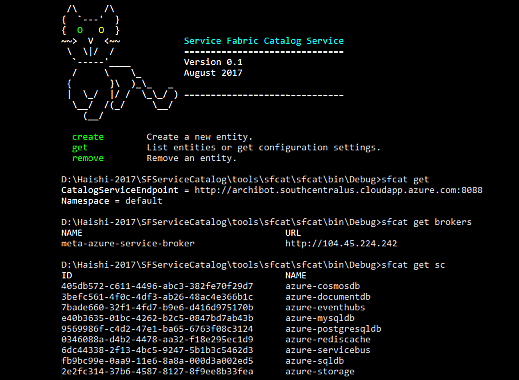| languages | products | page_type | description | |||
|---|---|---|---|---|---|---|
|
|
sample |
An add-on service to your Service Fabric cluster that allows you to provision and bind to Azure services through Open Service Broker API. |
Service Catalog is an add-on service to your Service Fabric cluster that allows you to provision and bind to Azure services through Open Service Broker API.
Clone this repository and build the SFServiceCatalog solution.
Modify the appsettings.json file under the CatalogService project to point to the OSB API endpoint you want to use:
"ActorSwitches": {
"OSBEntityCatalogActor": {
"OSBEndpoint": "<OSB API endpoint>",
"OSBUser": "<user name>",
"OSBPassword": "<password>"
}
},You can use any OSB-API compliant Service Broker. There are several implementation on Internet:
Then, deploy the SFServiceCatalog application to your Service Fabric cluster. Now, you've got a Catalog Service on your cluster.
Service Catalog is currently managed by a sample command-line tool, sfcat. You can build sfcat by building the sfcat solution under tools\sfcat folder. Modify the app.config under sfcat to point sfcat to your Catalog Service endpoint:
<appSettings>
<add key="CatalogServiceEndpoint" value="http://localhost:8088"/>
...
</appSettings>With current version, you need to register your OSB endpoint with your Catalog Service using sfcat. We are looking at making this part of the Catalog Service configuration so that you don't have to use sfcat at all.
sfcat create broker --name <broker name of your choice> --url <OSB endpoint> --user <user name> --password <password>Next, you can:
- Althoug the API supports it, you can't add multiple OSB API endpoints to the system yet.
- Be default there are not OSB API endpoint registered. You need to use sfcat to register an OSB API endpoint before you can start creating service instances.
